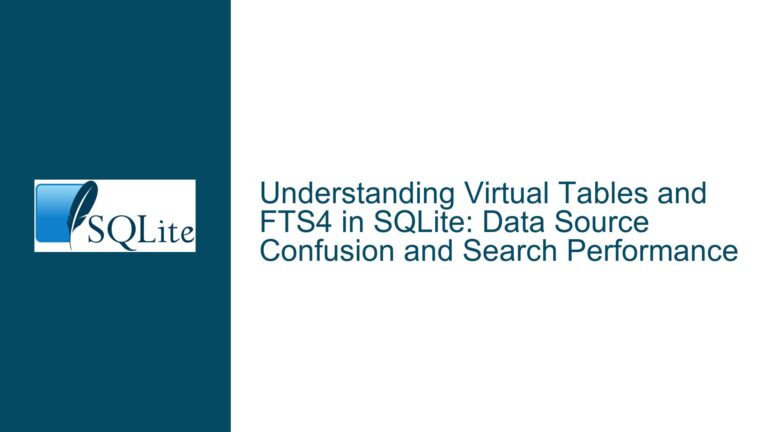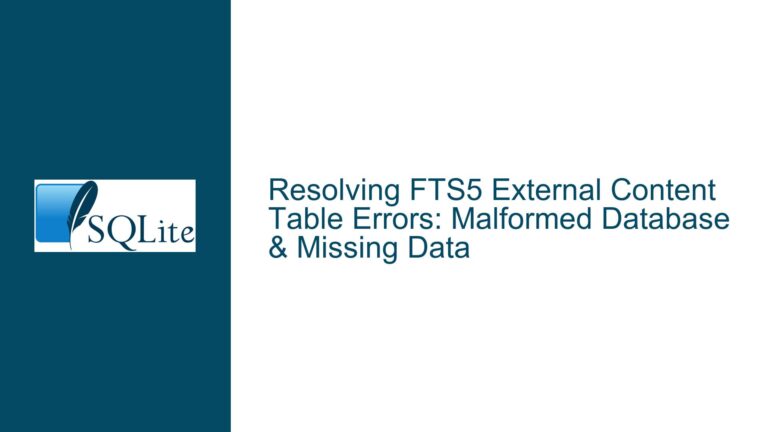Enhancing FTS5 Synonym Support with Dynamic Operations
Issue Overview: Static Synonym Handling in FTS5 and Performance Implications
The core issue revolves around the limitations of synonym handling in SQLite’s FTS5 (Full-Text Search) module. Currently, FTS5 supports synonyms in a largely static manner, requiring predefined synonym mappings or expensive index rebuilds to accommodate changes. While there are methods to dynamically handle synonyms during query execution, these approaches often incur significant performance penalties, especially for larger indexes.
The primary pain point is the inability to dynamically merge or duplicate term data sets within the FTS5 index without rebuilding the entire index. This limitation forces developers to either predefine all possible synonyms, which is impractical for evolving datasets, or accept the performance overhead of query-time synonym expansion. The latter approach requires querying multiple terms for each synonym, leading to increased computational complexity and slower response times.
Additionally, the lack of dynamic operations for managing term data sets restricts the ability to implement features like dynamic stop word lists or evolving synonym mappings. This rigidity can be particularly problematic in applications where the synonym list grows or changes over time, such as in natural language processing or content recommendation systems.
The proposed solution involves introducing new operations, such as merge_doclist and copy_doclist, to allow dynamic manipulation of term data sets within the FTS5 index. These operations would enable developers to merge or duplicate term data sets without requiring a full index rebuild, thereby improving flexibility and performance.
Possible Causes: Design Constraints and Performance Trade-offs in FTS5
The limitations in FTS5’s synonym handling stem from its design philosophy, which prioritizes simplicity and efficiency for common use cases. FTS5 is optimized for fast text search operations, and its architecture is built around immutable data structures that ensure consistent performance. However, this design choice comes at the cost of reduced flexibility for dynamic use cases, such as evolving synonym mappings.
One of the key constraints is the immutable nature of the FTS5 index. Once a term is indexed, its associated document list (doclist) cannot be easily modified without rebuilding the index. This immutability ensures that the index remains compact and efficient for search operations but makes it challenging to implement dynamic features like synonym merging or duplication.
Another factor is the trade-off between query-time and index-time synonym handling. FTS5 currently supports query-time synonym expansion through the OR operator, which allows developers to specify synonyms directly in the query. While this approach is flexible, it can lead to performance degradation, especially for large indexes or complex queries. Index-time synonym handling, on the other hand, requires predefined mappings and cannot accommodate changes without rebuilding the index.
The lack of dynamic operations for managing term data sets also reflects a broader limitation in FTS5’s API. While the module provides powerful features for text search, it does not expose low-level operations for manipulating the index structure. This limitation makes it difficult to implement advanced features like dynamic synonym handling or stop word management without resorting to workarounds or external tools.
Troubleshooting Steps, Solutions & Fixes: Implementing Dynamic Synonym Handling in FTS5
To address the limitations of static synonym handling in FTS5, developers can explore several approaches, ranging from workarounds using existing features to proposing enhancements to the FTS5 module. Below, we outline a detailed roadmap for implementing dynamic synonym handling, including potential solutions and their trade-offs.
1. Leveraging Query-Time Synonym Expansion
The simplest approach to handling synonyms in FTS5 is to use query-time synonym expansion. This method involves specifying synonyms directly in the query using the OR operator. For example, to search for documents containing either "first" or "1st," the query would look like this:
SELECT * FROM fts WHERE fts MATCH 'first OR 1st';
While this approach is easy to implement and does not require any changes to the FTS5 module, it has significant performance implications. Each synonym added to the query increases the complexity of the search operation, as the query engine must scan the index for multiple terms. For large indexes or queries with many synonyms, this can lead to noticeable slowdowns.
To mitigate the performance impact, developers can optimize their queries by limiting the number of synonyms or using additional filters to narrow down the search results. However, these workarounds are not always practical, especially in applications where the synonym list is large or frequently changing.
2. Preprocessing Synonyms Before Indexing
Another approach is to preprocess synonyms before indexing the documents. This method involves expanding the text to include all possible synonyms for each term during the indexing process. For example, if "first" and "1st" are synonyms, the text "This is the first example" would be indexed as "This is the first 1st example."
Preprocessing synonyms ensures that all relevant terms are included in the index, eliminating the need for query-time synonym expansion. However, this approach has several drawbacks. First, it increases the size of the index, as each synonym is treated as a separate term. Second, it requires rebuilding the index whenever the synonym list changes, which can be expensive for large datasets.
To implement this approach, developers can use external tools or scripts to preprocess the text before inserting it into the FTS5 table. While this method provides a workaround for dynamic synonym handling, it is not ideal for applications where the synonym list evolves over time.
3. Proposing New FTS5 Operations for Dynamic Synonym Handling
The most robust solution to the limitations of static synonym handling is to enhance the FTS5 module with new operations for dynamically managing term data sets. The proposed operations, merge_doclist and copy_doclist, would allow developers to merge or duplicate term data sets without rebuilding the index.
The merge_doclist operation would combine the document lists of two terms under a single term. For example, the following command would merge the document lists of "first" and "1st" under the term "first":
INSERT INTO fts('fts', 'merge_doclist') VALUES ('first', '1st');
After executing this command, searching for "first" would return documents containing either "first" or "1st." This operation would be particularly useful for applications where synonyms need to be dynamically added or updated.
The copy_doclist operation would duplicate the document list of one term under another term. For example, the following command would copy the document list of "first" to "1st":
INSERT INTO fts('fts', 'copy_doclist') VALUES ('first', '1st');
This operation would allow developers to create new synonyms without modifying the original term’s document list. It would also enable the implementation of dynamic stop word lists by copying an empty document list to unwanted terms.
Implementing these operations would require changes to the FTS5 module’s internal data structures and API. While this approach involves significant development effort, it would provide a powerful and flexible solution for dynamic synonym handling in FTS5.
4. Evaluating Performance and Trade-offs
When implementing dynamic synonym handling in FTS5, it is essential to consider the performance implications of each approach. Query-time synonym expansion is the easiest to implement but can lead to performance degradation for large indexes or complex queries. Preprocessing synonyms before indexing avoids query-time overhead but increases the size of the index and requires rebuilding the index when the synonym list changes.
The proposed merge_doclist and copy_doclist operations offer a balance between flexibility and performance. By allowing dynamic manipulation of term data sets, these operations eliminate the need for query-time synonym expansion and index rebuilds. However, they require careful implementation to ensure that the index remains efficient and consistent.
Developers should evaluate their specific use cases and performance requirements when choosing an approach to dynamic synonym handling. For applications with small or static synonym lists, query-time expansion or preprocessing may be sufficient. For applications with large or evolving synonym lists, the proposed FTS5 enhancements would provide a more scalable and maintainable solution.
5. Best Practices for Dynamic Synonym Handling
To maximize the effectiveness of dynamic synonym handling in FTS5, developers should follow these best practices:
Minimize Query Complexity: When using query-time synonym expansion, limit the number of synonyms in each query to avoid performance degradation. Use additional filters or ranking algorithms to narrow down the search results.
Optimize Indexing Workflow: If preprocessing synonyms before indexing, ensure that the text expansion process is efficient and does not introduce unnecessary redundancy. Use batch processing or incremental updates to minimize the impact of index rebuilds.
Monitor Index Performance: Regularly monitor the size and performance of the FTS5 index, especially when using dynamic operations like
merge_doclistandcopy_doclist. Use tools likeEXPLAIN QUERY PLANto analyze query performance and identify potential bottlenecks.Plan for Synonym Evolution: Design the synonym handling system with future changes in mind. Use a modular architecture that allows for easy updates to the synonym list and supports dynamic operations for managing term data sets.
By following these best practices, developers can ensure that their FTS5 implementation remains efficient, flexible, and scalable, even as the synonym list evolves over time.
Conclusion
The limitations of static synonym handling in FTS5 present a significant challenge for developers working on applications with evolving synonym lists. While query-time synonym expansion and preprocessing offer workarounds, they come with performance and maintenance trade-offs. The proposed merge_doclist and copy_doclist operations provide a robust solution for dynamic synonym handling, enabling developers to manage term data sets without rebuilding the index.
By carefully evaluating the performance implications and following best practices, developers can implement dynamic synonym handling in FTS5 that meets the needs of their applications. Whether through existing features or proposed enhancements, the goal is to achieve a balance between flexibility, performance, and maintainability in text search operations.






